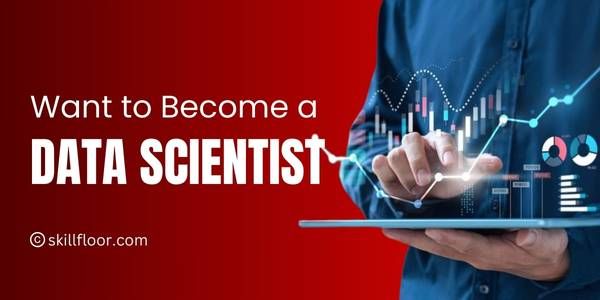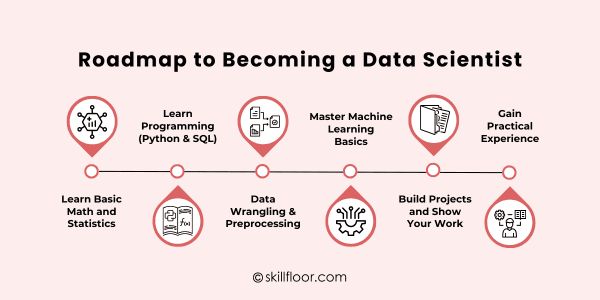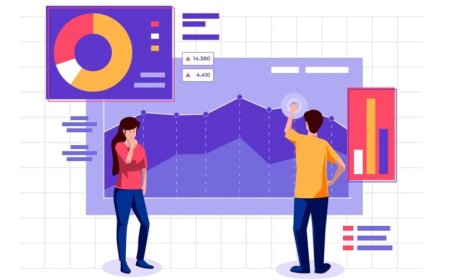How to Become a Data Scientist
Want to become a data scientist? Learn the essential skills, steps, and tips to break into this high-demand field today—don’t miss your chance to advance!

I first believed that data science was exclusive to programmers or math geniuses. But the more I looked into it, the more I understood that anyone can learn it with effort and perseverance. Writing, finance, and marketing professionals have all become data scientists, in my experience. Only curiosity and commitment are required—a degree is not!
In 2025, there will be a sharp increase in the need for data scientists as businesses like Google, Netflix, and Amazon use data to enhance their offerings. There are many excellent employment options when you learn how to become a data scientist. Companies want professionals to evaluate data, and a 30% increase in employment is anticipated.
Experts are needed by businesses to evaluate data and make better choices. E-commerce, healthcare, and banking all benefit from this ability. Investigating data science is a terrific option if you like working with statistics and solving issues. The time to begin studying is now, regardless of your background!
Don't worry if you're just getting started! Many successful data scientists started without any coding knowledge. The secret is to practice frequently, construct projects, and learn things step by step. Consistency is crucial, regardless of whether you go for self-learning, boot camp, or a course. You will advance in this sector with practical experience.
What is Data Science?
Data science is the process of gathering, evaluating, and using data to solve issues and gain new insights. It helps businesses make better judgments, enhance their goods, and comprehend consumer behavior. Combining machine learning, programming, and statistics, it transforms unprocessed data into useful knowledge.
Data science is used in a wide range of businesses, from e-commerce to healthcare to anticipate illnesses. While banks utilize data trends to identify fraud, social media sites use it to provide pertinent material. Learning data science may lead to new and fulfilling employment prospects as the need for data-driven solutions grows.
Why is Data Science in High Demand?
-
Businesses Need Data to Grow: Data is used by businesses to better understand consumer behavior and enhance offerings. Big corporations and small startups alike use data to stay ahead of the competition and make smarter decisions.
-
High-Paying Career Opportunities: Excellent pay and professional advancement are available in data science. Businesses are willing to pay much for professionals who can use data analysis and astute insights to address practical issues.
-
Technology is Evolving Rapidly: Businesses require data science professionals to handle and analyze complicated data as automation, AI, and machine learning transform sectors. Globally, this generates many career possibilities.
-
Growing Demand Across Industries: Data science isn't limited to IT companies. Experts in trend analysis and data-driven decision-making are essential in the fields of marketing, finance, healthcare, and e-commerce.
-
More Learning Options Available: Many data science courses are available nowadays to assist both professionals and beginners in developing their abilities. Universities, boot camps, and online resources all provide organized learning pathways for launching a career in this area.
-
Businesses Need Smarter Strategies: Businesses that are data-driven do better. They employ information to lower risks, forecast trends, and enhance the consumer experience. In every business, this raises the need for qualified data scientists.
Who is a Data Scientist?
A data scientist is a person who examines data to uncover valuable information. They gather, purify, and arrange data, ensuring that it is structured for analysis. Understanding Data Science Basics is crucial, as it involves working with statistics, algorithms, and machine learning models to forecast outcomes accurately. Businesses rely on data scientists to solve complex problems, enhance products, and make data-driven decisions that drive growth and efficiency.
Data scientists are employed in a wide range of sectors, including marketing, finance, and healthcare. They assist businesses in identifying fraud, comprehending consumer behavior, and even forecasting future trends. Strong problem-solving abilities and a passion for data enable them to transform unstructured data into insightful knowledge that supports the expansion and success of enterprises.
The Growing Demand for Data Scientists in Various Industries
-
Technology and IT: Data scientists are used by IT businesses to optimize algorithms, improve software, and improve user experience. Data is crucial to the development of digital innovations, from AI to cybersecurity.
-
Healthcare and Medicine: Data science is used by pharmaceutical businesses and hospitals to enhance patient care, anticipate illnesses, and customize therapies. Additionally, it aids in medical research and medication development.
-
Finance and Banking: To identify fraud, evaluate risks, and enhance investment strategies, banks and other financial organizations rely on data scientists. Data facilitates safer and more intelligent financial decision-making.
-
Retail and E-Commerce: Data science is used by online retailers like Amazon and Walmart to manage inventories, provide product recommendations, and customize consumer experiences, all of which make shopping more effective and convenient.
-
Marketing and Advertising: Businesses use consumer behavior analysis to develop marketing strategies and tailored advertisements. Businesses may enhance their advertising efforts by using data science to better understand consumer preferences.
-
Manufacturing and Supply Chain: Data is used by factories and logistics companies to estimate demand, control inventories, and save expenses. Making informed judgments based on data enhances productivity and quality of output.
Key Responsibilities of a Data Scientist Across Various Industries
-
Collecting and Cleaning Data: Raw data is gathered by data scientists from many sources. In order to ensure the data is reliable and prepared for analysis, they clean and arrange it to eliminate mistakes.
-
Analyzing Trends and Patterns: They examine data to identify trends, patterns, and valuable insights. This aids companies in comprehending consumer behavior, industry trends, and possible hazards.
-
Building Predictive Models: Utilizing statistics and machine learning, they develop models that predict future patterns. Businesses may enhance operations and make well-informed decisions with the help of these models.
-
Developing Data-Driven Solutions: Data scientists use data insights to provide solutions for business challenges. They support businesses in enhancing their product development, customer service, marketing, and sales.
-
Communicating Insights to Teams: They provide data findings in straightforward presentations, charts, and reports. This aids company executives in comprehending intricate data and improving their decision-making.
-
Enhancing Business Performance: They assist businesses with cost reduction, productivity enhancement, and product improvement through the application of data science methodologies. Success and business growth are directly impacted by their efforts.
Difference Between a Data Scientist, Data Analyst, and Data Engineer
|
Category |
Data Scientist |
Data Analyst |
Data Engineer |
|
Main Role |
Builds models to predict future trends and solve problems using data. |
Analyzes past data to find insights and create reports. |
Designs and manages databases to store and process data efficiently. |
|
Skills Required |
Machine learning, Python/R, statistics, deep learning. |
SQL, Excel, data visualization, reporting tools. |
SQL, big data tools (Hadoop, Spark), cloud computing. |
|
Tools Used |
Python, R, TensorFlow, Scikit-learn. |
Excel, Tableau, Power BI, SQL. |
Apache Spark, Hadoop, AWS, Airflow. |
|
Focus Area |
Predictive modeling, AI, and automation. |
Data interpretation, visualization, and reporting. |
Building pipelines to collect, clean, and store data. |
|
Industry Demand |
High demand in AI, finance, healthcare, and tech industries. |
Needed in business intelligence, marketing, and research. |
Essential for big data projects, cloud computing, and large-scale applications. |
|
Career Path |
Requires strong coding and math skills, often a master's or Ph.D. |
Entry-level friendly, good for transitioning into data science. |
Best for those interested in data infrastructure and backend systems. |
Roadmap to Becoming a Data Scientist
1. Learn Basic Math and Statistics
Since data science is all about evaluating statistics, it's critical to comprehend the following fundamentals:
-
Probability and Statistics: While statistics assist in the analysis of patterns, probability aids in the prediction of results. These abilities help with trend analysis and data-driven decision-making.
-
Linear Algebra: Managing big datasets and creating machine learning models are made easier with linear algebra. It is necessary for algorithms that use equations and numbers.
-
Calculus: Machine learning model optimization is aided by calculus. Because it enhances predictions and comprehends data changes, it is essential to deep learning.
Tip: Math shouldn't be a worry! Prioritize fundamental ideas first. Learning is made simple and enjoyable by the free courses available on YouTube and Khan Academy.
2. Learn Programming (Python & SQL)
Data scientists use programming to process data and build models.
-
Python: Python is frequently used in data science for automation, model creation, and data analysis. It offers several useful libraries, such as Pandas, and is easy for beginners to use.
-
SQL: SQL facilitates database management, retrieval, and storage. Managing structured data and doing fast searches on huge datasets need it.
Tip: Learn the fundamentals of Python first, then investigate data analysis and visualization tools like Pandas, NumPy, and Matplotlib. Learning will be facilitated by practical experience!
3. Understand Data Wrangling & Preprocessing
Data in the real world is messy. It frequently contains mistakes, missing data, and unrelated information. Data must be cleaned and arranged before use.
-
Learn Pandas for Data Manipulation: Pandas assists with mistake removal, missing value filling, and chaotic data organization. It facilitates data analysis and gets it ready for machine learning models.
-
Learn Seaborn & Matplotlib for Data Visualization: Charts and graphs are made easier to comprehend data patterns with the help of Seaborn and Matplotlib. Data visualization improves decision-making by clarifying findings.
Tip: Get a dataset from Kaggle, then work on cleaning and displaying it. Your data management abilities will rapidly develop with practical practice!

4. Master Machine Learning Basics
Machine learning helps computers make decisions based on data. Start with:
-
Supervised Learning – Learn with Labeled Data: Models are trained using supervised learning with labeled data, which means that the right responses are known in advance. It is useful for jobs like price prediction and email classification.
-
Unsupervised Learning – Find Patterns Without Labels: Without predetermined labels, unsupervised learning uncovers hidden patterns in data. In business analytics, it is employed for activities like customer segmentation and anomaly detection.
Tip: Use Python's scikit-learn first. Work on simple tasks like email classification or home price prediction to discover how machine learning models operate.
5. Build Projects and Show Your Work
Businesses want to see your abilities, not just your credentials. Create authentic projects to demonstrate your proficiency.
-
Predict Trends: Forecast future stock prices using historical data. This enhances your ability to foresee and build your Data Science portfolio for prospective companies.
-
Create Recommendations: Create a system that makes recommendations for movies, music, or goods based on user tastes, similar to what Netflix and Spotify offer its users.
-
Analyze Sentiments: Use social media comments or customer reviews to get feedback, which can assist firms learn what customers enjoy and don't like about their products.
Tip: Share your projects on LinkedIn or Kaggle and upload them to GitHub to highlight your abilities and draw in employers.
6. Gain Practical Experience
Work on freelancing projects, apply for internships, contribute to open-source projects, or take part in Kaggle challenges to obtain practical experience if you are unable to find employment right away.
-
Freelancing: Provide data analysis services on websites such as Upwork and Fiverr. Applying your abilities, gaining experience, and developing a solid portfolio are all made possible by freelancing.
-
Internships: Internships, even those without compensation, offer invaluable experience. Collaborating with experts enhances your ability to solve problems in real-world scenarios and helps you comprehend data concerns.
-
Open-Source Contributions: Participating in open-source data science initiatives enhances collaboration and coding abilities. It also enables you to network with seasoned developers and demonstrate your skills to prospective employers.
Tip: Networking is really effective! To find job openings and acquire career insights, join LinkedIn groups, go to meetups, and network with people in the field.
Educational Paths to Become a Data Scientist
-
University Degree in Data Science: Strong Data Scientist Skills can be developed with a degree in statistics, mathematics, or computer science. Universities expose students to real-world data issues and offer organized learning.
-
Online Courses and Certifications: Flexible courses are available on platforms such as edX, Udemy, Skillfloor, and Coursera. These enable novices to acquire fundamental data scientist skills at their own speed, such as machine learning, Python, and SQL.
-
Bootcamps for Fast Learning: Data science boot camps offer practical instruction through real-world projects. For career changers seeking quick, intensive, job-focused training, they are excellent.
-
Self-Learning with Free Resources: Self-learners may practice coding, data analysis, and visualization without a formal degree due to a variety of free tools, such as blogs, open datasets, and YouTube courses.
-
Internships and Research Projects: Participating in research projects or internships makes learning more applicable and enhances work preparation by allowing theoretical information to be applied to real-world issues.
-
Contributing to Open-Source and Kaggle: By developing problem-solving abilities and gaining useful experience, taking part in open-source projects and Kaggle competitions helps in landing a job.
Exploring Career Opportunities in Data Science
Exciting prospects are abundant in the field of data science. Data Scientist jobs encourage innovation and problem-solving. It is a fulfilling career option since the Data Scientist's salary is competitive.
|
Job Title |
Description |
Average Annual Salary (INR) |
|
Enterprise Architect |
Designs and oversees the implementation of an organization's IT infrastructure, ensuring alignment with business goals. |
₹37,00,000 |
|
Application Architect |
Develops the framework for applications, ensuring they are scalable, secure, and optimized for performance across platforms. |
₹30,00,000 |
|
Data Architect |
Responsible for designing and managing an organization's data infrastructure, ensuring efficient storage and access to data. |
₹26,00,000 |
|
Quantitative Analyst |
Uses mathematical and statistical models to analyze financial data, assess risk, and inform investment decisions. |
₹22,90,000 |
|
Data Scientist |
Analyzes structured and unstructured data, builds predictive models, and supports business decision-making. |
₹18,00,000 |
|
Machine Learning Engineer |
Designs and develops machine learning systems, optimizing algorithms for automation, prediction, and pattern recognition. |
₹15,00,000 |
Entering the field of data science is thrilling and fulfilling. Anybody who wants to study, practice, and maintain their curiosity can enter the field. Start small, concentrate on the necessary abilities, and obtain practical experience if you're wondering How to Become a Data Scientist. There will only be more opportunities as companies depend more on data. Regardless of your experience, you can consistently learn How to Become a Data Scientist. Continue applying your knowledge, networking, and project-building. Because of the increasing demand, now is the ideal moment to learn How to Become a Data Scientist and build a prosperous career.































































